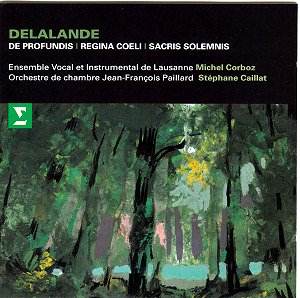As can be seen, these recordings are now twenty
and thirty years old and no matter what kind of a gloss I might
attempt to put on it I have to say that they sound it in more
ways than one.
But first the composer and the music.
De Lalande was most aptly described by one of
his pupils François Colin de Blamont as the "Latin
Lully" because, whereas Lully had concentrated mostly on
opera in French (there are a few motets), Delalande concentrated
on Church music some of it in Latin. Some of it is in part influenced
by the Italianate models brought over by Andre Campra (1660-1744).
Indeed De Lalande seems to have revised some of his music in the
early 18th Century in an attempt to move towards the
more popular and fashionable Italian style.
Maurice Bartholmey who wrote the first important
study on Campra tells us (and this is my own translation) that
"Delalande was forced to resign, since Louis XIV was set
on investing his music with a more modern character." In
preparing this review I decided to hear again the vast ‘Messe
de Requiem’ by Campra (Harmonia Mundi 1251 La Chapelle Royale/Herreweghe).
I was immediately struck by the similar formal lay-out, that is
a chorus number followed by a solo number throughout, each solo
number (often called a recit even when they weren’t!) being for
a different voice. I then thought what a much better composer
Campra seems to have been than De Lalande until, that is, I started
to consider again the performances on this present CD. This music,
in the hands of Herreweghe’s 1987 recording is so much more to
my taste than Corboz for many reasons. It comes down to the quality
of the singing. Too much vibrato is no longer considered acceptable
or indeed pleasant in Baroque music especially when it is not
controlled. That applies not only for soloists but also in choral
work - the focus of the note is unclear. Secondly the boxy recording
does not help and the soprano part appears to be a little distorted
in louder passages. The ‘Sacris Solemnis’ recording from 1980
is marginally better as a recording (although there is some background
hiss). The performance still features some rather ‘fat’ string
sound, overly slow tempi and too much vibrato in the sopranos.
This work however is better served by the soloists; especially
reference should be made to the high tenor in his solo aria. Perhaps
I am wrong but why is there a harpsichord and not an organ continuo?
The CD offers a well written and interesting
accompanying essay by Olivier Rouviere, but there are no texts
given at all. I realize that this CD is in the budget category
but I fail to see why not even the Latin texts could have been
given. No soloists are named which in some cases may be a blessing
but also track titles are not given in the ‘Sacris Solemnis’.
It is interesting to compare the ‘De Profundis’
of De Lalande which runs to approximately thirty-seven minutes
with a much shorter setting by his older contemporary Marc-Antoine
Charpentier (1636-1704) recorded by Erato in 1985 (Musica Polyphonica/
Louis Devos on 75246). It was Campra who by saying that Charpentier
had not such success in French opera but "had no peer for
Latin music" side-stepped De Lalande. Yet Charpentier’s approach
is a little more satisfying. Chorale sections are broken up with
more orchestral interpolations. With vocal duets and trio sections
there is more variety of texture and less textual repetition.
Nevertheless I feel more moved by De Lalande’s opening and closing
settings of the ‘Requiem Aeternam’ than by Charpentier who although
inspired is contrapuntally more complex and strikes the heart
less profoundly.
I am convinced that De Lalande is a fine composer
illuminating the text with true meaning and insight, understanding
the metrical nature of Latin verse and metre, blending contrapuntal
skill with the new Italianate interest in melody. For me at least
this CD is not the recording to choose. I would recommend the
version of the ‘De Profundis’, coupled with some instrumental
works, by Jeffrey Skidmore on ASV (Gaudeamus 141) which seems
to be a perfect and stylistically modern and convincing introduction
to this underrated and worthy composer.
Gary Higginson
